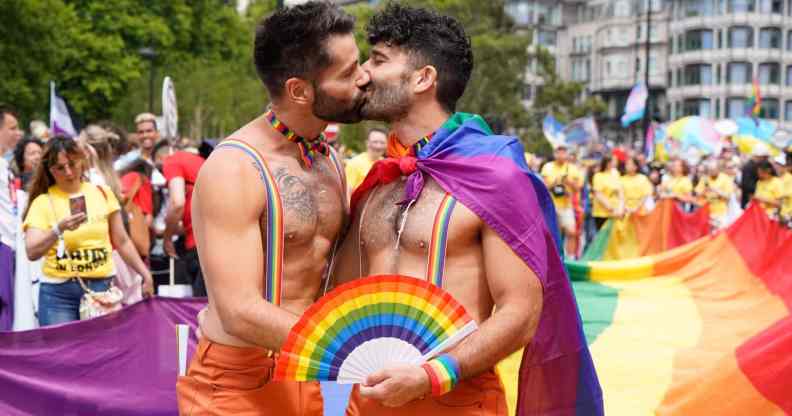Anti-LGBTQ+ hate crime reports explode across UK, damning police figures confirm

Hate crimes against LGBTQ+ Brits has been soaring for years. (NIKLAS HALLE’N/AFP via Getty Images)
Anti-LGBTQ+ violence in the UK is rising at a record-breaking rate, alarming police figures have shown.
Reports of homophobic hate crimes more than doubled in five years, shooting from 10,003 in 2016-17 to 26,824 in 2021-22. In the past year, the figure soared by 32 per cent – the biggest yearly rise since record-keeping began.
Transphobic hate crimes similarly swelled by 240 per cent, from 1,292 reports in 2016-17 to 4,399 five years later, in what is also believed to be the largest increase ever seen by the authorities.
Across the UK’s 45 territorial police forces, just five reported a decrease in reports of homophobic hate crimes compared to the previous reporting year, VICE World News reported.
All others recorded dizzying increases, with Merseyside Police reporting the highest rise from 64 in 2014-15 to 1,618 between 2021 and 2022.
London has emerged as the epicentre of hate crimes based on sexual orientation. The Metropolitan Police Service tallied 3,794 homophobic hate crimes in 2021-22, an increase of 28 per cent from the previous year.
Derbyshire, Humberside, Northamptonshire, South Yorkshire and Suffolk were the only regions that saw hate crimes dip compared to the previous year. But the stats are still higher than five years ago.
England’s capital saw 434 transphobic hate crimes in the past year – once again the highest number recorded by any police force. Manchester followed with 320 hate crimes fuelled by hatred for a person’s gender identity.
While some government officials and prosecutors have blamed the increase partly on greater confidence among victims in reporting incidents, activists point elsewhere.

Morgan Fevre was viciously attacked by someone for wearing a sequined jacket. (GoFundMe/Paul Fevre)
“In recent years, we’ve seen a disproportionate rise in official hate crime figures in the UK, but we know we’re still not seeing the full picture,” Leni Morris, the CEO of LGBTQ+ anti-abuse charity Galop, told PinkNews.
Morris added: “This year, in particular, we’ve seen a significant rise in hate crime experienced by the LGBT+ community. The narrative around monkeypox and continuing transphobia in the media contribute to a hostile environment for LGBT+ people.
“These things also make our community more visible in the eyes of the public – and when we are more visible, this often leads to a rise in attacks.”
Trans rights have increasingly been put on the line by the government, with ministers excluding trans people from a conversion therapy law. Some have eyed up restrictions on the sports trans people can play, the healthcare they can receive and even whether they can be who they are at school.
Yet as alarming as the police figures are, Morris said they actually understate the problem. Galop’s 2021 Hate Crime report showed that only one in eight queer victims of hate crime reported what had happened to them.
Only 14 per cent of anti-LGBTQ+ hate crimes are resolved by the police, the investigative journalism unit Liberty Investigates found.
The police need to do more to protect LGBTQ+ Brits, said Nancy Kelley, the CEO of Stonewall. “As a society, we all need to do more to combat anti-LGBTQ+ violence and call out abuse, harassment and anti-LGBTQ+ sentiment wherever we see it, but we also need a greater commitment from the police to take decisive action to follow up and prosecute these offences.
“This can’t continue.”
In 2022, a gay man was beaten for wearing a “girl’s jacket”, and another was left drenched in blood after being called a “batty boy“. Thugs filmed the moment they threatened to stab a trans woman in a takeaway, while teens followed a gay couple home to shout abuse at the pair for 20 minutes.
One gay couple in Southampton was left bloodied when a group of teens reportedly punched them on their way home from a nightclub – all the couple did was hold hands.
“Hate crime has real and lasting impacts on victims and survivors, and it is important to remember that each of these reports represents a real person,” Morris added.
“There’s still significant work to be done to improve the response to anti-LGBT+ abuse and ensure that LGBT+ victims are given the same level of support as everyone else.”

